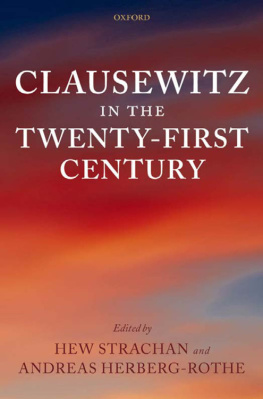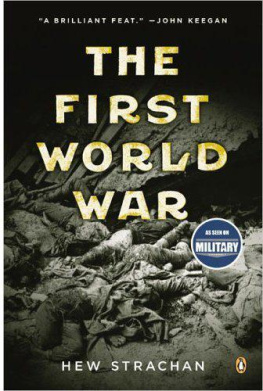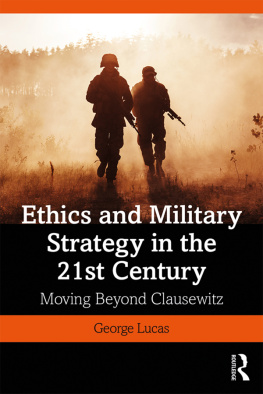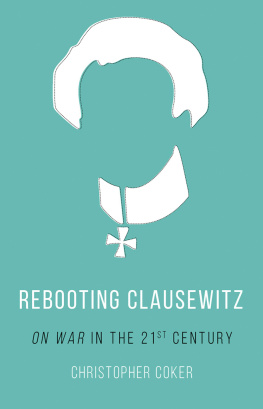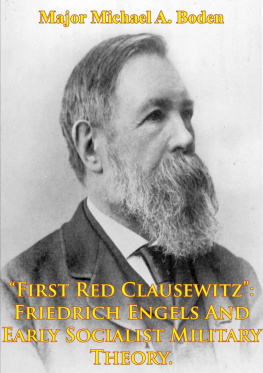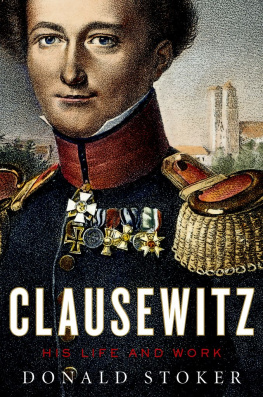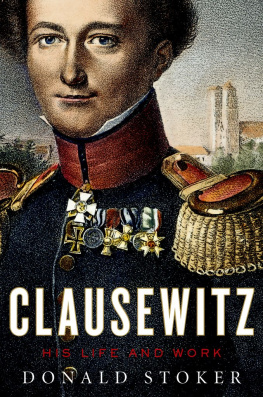Hew Strachan - Clausewitz in the Twenty-First Century
Here you can read online Hew Strachan - Clausewitz in the Twenty-First Century full text of the book (entire story) in english for free. Download pdf and epub, get meaning, cover and reviews about this ebook. year: 2007, publisher: Oxford University Press, USA, genre: Science. Description of the work, (preface) as well as reviews are available. Best literature library LitArk.com created for fans of good reading and offers a wide selection of genres:
Romance novel
Science fiction
Adventure
Detective
Science
History
Home and family
Prose
Art
Politics
Computer
Non-fiction
Religion
Business
Children
Humor
Choose a favorite category and find really read worthwhile books. Enjoy immersion in the world of imagination, feel the emotions of the characters or learn something new for yourself, make an fascinating discovery.
- Book:Clausewitz in the Twenty-First Century
- Author:
- Publisher:Oxford University Press, USA
- Genre:
- Year:2007
- Rating:3 / 5
- Favourites:Add to favourites
- Your mark:
- 60
- 1
- 2
- 3
- 4
- 5
Clausewitz in the Twenty-First Century: summary, description and annotation
We offer to read an annotation, description, summary or preface (depends on what the author of the book "Clausewitz in the Twenty-First Century" wrote himself). If you haven't found the necessary information about the book — write in the comments, we will try to find it.
Clausewitz in the Twenty-First Century — read online for free the complete book (whole text) full work
Below is the text of the book, divided by pages. System saving the place of the last page read, allows you to conveniently read the book "Clausewitz in the Twenty-First Century" online for free, without having to search again every time where you left off. Put a bookmark, and you can go to the page where you finished reading at any time.
Font size:
Interval:
Bookmark:

CLAUSEWITZ IN THE TWENTY-FIRST CENTURY
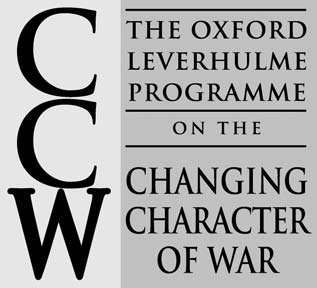
The Changing Character of War Programme is an inter-disciplinary research group located at the University of Oxford, and funded by the Leverhulme Trust.
Clausewitz in the
Twenty-First Century
Edited by
H EW S T R AC H A N A N D A N D R E A S H E R B E RG - ROT H E
Great Clarendon Street, Oxford ox2 6dp
Oxford University Press is a department of the University of Oxford.
It furthers the Universitys objective of excellence in research, scholarship, and education by publishing worldwide in
Oxford New York
Auckland Cape Town Dar es Salaam Hong Kong Karachi
Kuala Lumpur Madrid Melbourne Mexico City Nairobi
New Delhi Shanghai Taipei Toronto
With offices in
Argentina Austria Brazil Chile Czech Republic France Greece Guatemala Hungary Italy Japan Poland Portugal Singapore South Korea Switzerland Thailand Turkey Ukraine Vietnam Oxford is a registered trade mark of Oxford University Press in the UK and in certain other countries
Published in the United States
by Oxford University Press Inc., New York
The several contributors 2007
The moral rights of the authors have been asserted
Database right Oxford University Press (maker)
First published 2007
All rights reserved. No part of this publication may be reproduced, stored in a retrieval system, or transmitted, in any form or by any means, without the prior permission in writing of Oxford University Press, or as expressly permitted by law, or under terms agreed with the appropriate reprographics rights organization. Enquiries concerning reproduction outside the scope of the above should be sent to the Rights Department, Oxford University Press, at the address above
You must not circulate this book in any other binding or cover and you must impose the same condition on any acquirer
British Library Cataloguing in Publication Data
Data available
Library of Congress Cataloging-in-Publication Data
Clausewitz in the twenty-first century / edited by Hew Strachan and Andreas Herberg-Rothe.
p. cm.
ISBN 9780199232024 (alk. paper)
1. Clausewitz, Carl von, 17801831. Vom Kriege. 2. Military art and science. 3. War. I. Strachan, Hew. II. Herberg-Rothe, Andreas. III. Title: Clausewitz in the 21st century.
U102.C6643C545 2007
355.02dc22
2007014610
Typeset by SPI Publisher Services, Pondicherry, India
Printed in Great Britain
on acid-free paper by
Biddles Ltd, Kings Lynn, Norfolk
ISBN 9780199232024
1 3 5 7 9 10 8 6 4 2
Foreword
Clausewitz On War : A History of the
HowardParet Translation
The idea of a new translation of On War originated in the late 1950s when Peter Paret and I were working together at Kings College London. Peter was studying the connection between military and political ideas in eighteenth-century Prussia for his thesis on Yorck von Wartenburg; I was devising my first courses for the new Department of War Studies. Peter was particularly concerned with the inaccuracies and misinterpretations in the existing English translations of On War. I was more interested in the continuing value of the text as a didactic tool for both civilian and professional students of war
particularly its insight into the concept of friction and the central importance of moral forces, of which, during my own military service, I had become very aware.
On returning to Princeton in 1961, Peter took up the matter with the historian Gordon Craig and the political scientist Klaus Knorr. Between them they persuaded the Princeton University Press to sponsor an ambitious project for a translation of all Clausewitzs military and political writings in six volumes, each with a separate editor and translator. A meeting of those interested took place in Berlin in June 1962, attended by Werner Hahlweg, whose edition of On War would provide the basis for the English translation; the American historian John Shy; Knorr, Craig, and, in addition to Peter and myself, the strategic thinker Bernard Brodie. Brodie had just published his work Strategy in the Nuclear Age and was particularly interested in Clausewitzs thinking about limited war. Klaus Knorr and the Press were very anxious to enlist his cooperation, since they considered, quite rightly, that his name would give the project credibility with a far wider audience. A certain tension developed between the historians on the panel, who saw me as the appropriate editor for On War, and the political scientists and representatives of the Press, who preferred Brodie. The problem was resolved by appointing both of us. Since neither had sufficient command of German to undertake the translation, I undertook to find a professional translator, while Peter, who was virtually bilingual, would exercise a droit de regard over all six volumes.
vi
Foreword
I was fortunate in finding an excellent translator in Angus Malcolm. Angus was a former member of the British Foreign Office who, having recently completed a translation of Karl Demeters The German Officer Corps, was broadly familiar with the subject matter. He had the further advantage of living within easy walking distance from me in London. But the work made slow progress. Malcolm and I, working in London, produced drafts that we tried to make as close to contemporary English usage as possible. We then checked these, first with Peter, who by now was teaching at the University of California; then with Brodie in Los Angeles; and finally with the Princeton University Press in New Jersey whose translators found much of the MalcolmHoward version too colloquial for their liking: all this in an era before either fax machines or email had been invented. By 1970, the task was still not complete, and poor Malcolm died while still at work on the project.
Yet even less progress had been made on the other volumes in the projected series. In fact, none of them got off the ground at all. Understandably, Princeton University Press cancelled the original project. That On War survived owed much to the continuing enthusiasm and influence of Bernard Brodie
whose enthusiasm, indeed, was so great that his introductory essay swelled to such a length that much of it had to be detached and printed as a separate afterword. In 1974, Brodie persuaded the Press to sign a new contract. Peter and I then undertook a revision of the entire text, and the volume finally appeared in 1976.
Its publication was timely. The experience of the Vietnam War had interested both military leaders and political scientists in the relations between political and military leadership. The continuing menace of nuclear weapons made the distinction between absolute and limited war alarmingly relevant; while Clausewitzs emphasis on friction, moral forces, and leadership qualities gave him credibility with professional soldiers who might otherwise have found much of his writing either excessively abstract or out of date. It was our good fortune to be able to present his work in a text that was accessible both to military colleges and to university students.
There still remained problems of translation that we had failed to iron out.
Politik, for example: should it be policy or politics? Neither carry the full grandeur of the original: both imply that soldiers were being instructed to subordinate themselves to the intrigues of mere politicians and still remain a sticking point for such distinguished commentators as Sir John Keegan.
Next pageFont size:
Interval:
Bookmark:
Similar books «Clausewitz in the Twenty-First Century»
Look at similar books to Clausewitz in the Twenty-First Century. We have selected literature similar in name and meaning in the hope of providing readers with more options to find new, interesting, not yet read works.
Discussion, reviews of the book Clausewitz in the Twenty-First Century and just readers' own opinions. Leave your comments, write what you think about the work, its meaning or the main characters. Specify what exactly you liked and what you didn't like, and why you think so.

